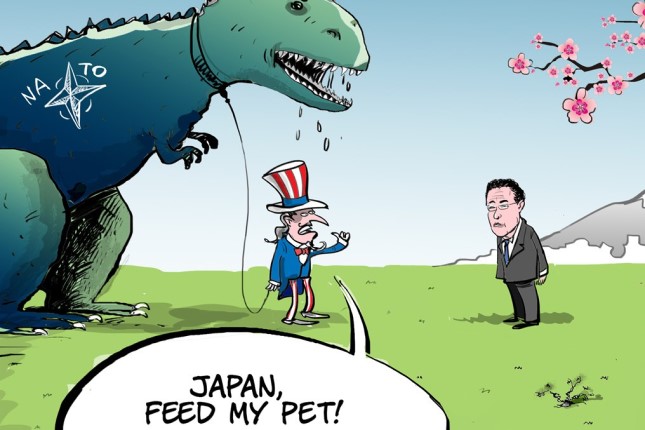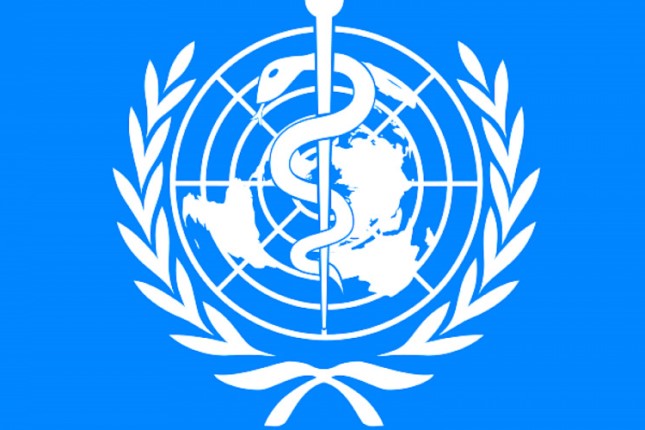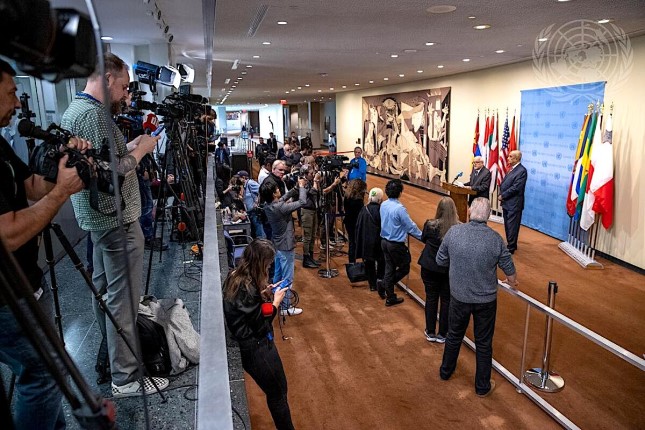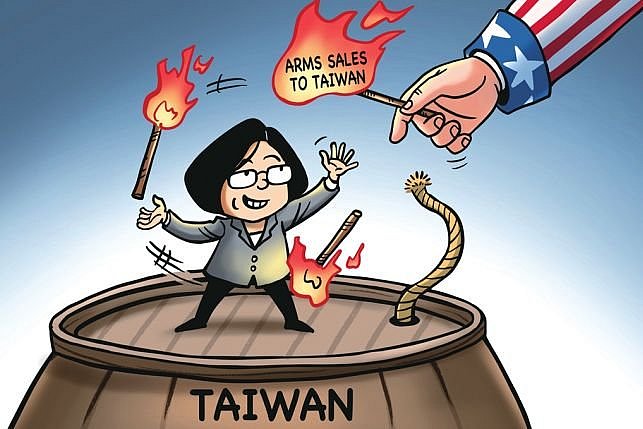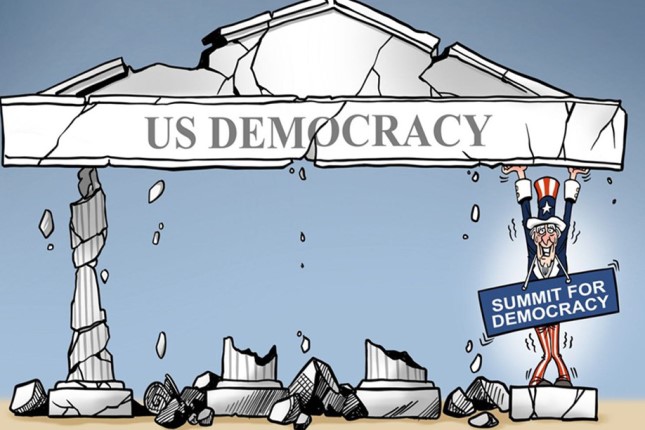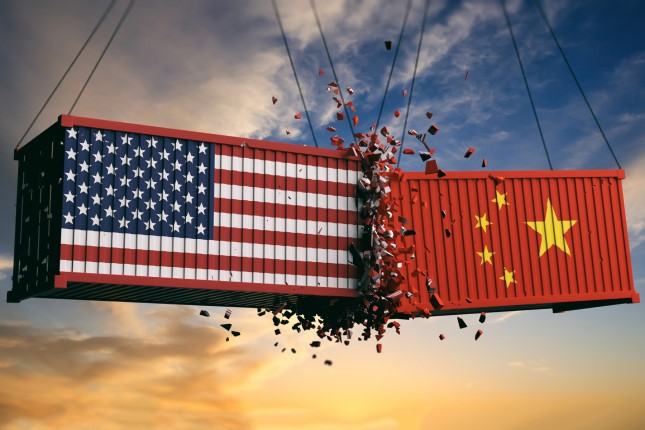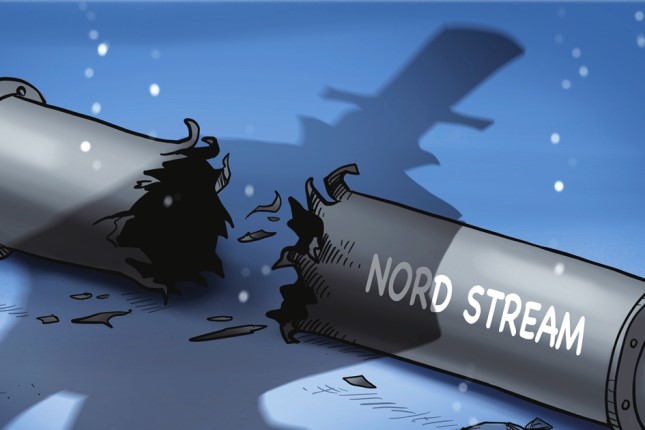Rifts within the NATO alliance over the potential expansion of the bloc's presence in Asia Pacific ahead of the NATO summit next week have been exposed by strong opposition from French President Emmanuel Macron. Chinese experts believe NATO's intention to extend its tentacles into Asia Pacific region not only exposes the selfish purpose of the US, which plays a central role in the alliance, to impose its own hegemonic intention over other NATO members' interests, but will further divide the group as in Europe, France may not stand alone in its opposition.
This year marks the second consecutive year that leaders from both Japan and South Korea will attend the summit. Observers see it as a sign that the two countries are seeking closer ties to better coordinate Washington's strategic moves to contain China. Such a "short-sighted" move will surely trigger China's strong opposition and result in regional countries' heightened vigilance.
NATO leaders will meet in Vilnius, capital of Lithuania from Tuesday to Wednesday. This summit is earmarked as a moment for making progress on the plan to open a liaison office in Japan, which would represent the organization's first outpost in the region.
Japanese Prime Minister Fumio Kishida, who is scheduled to participate in the summit for the second year in a row, will use the opportunity to stress the need for relations between Japan and NATO to be stronger, Japanese Chief Cabinet Secretary Hirokazu Matsuno said on Friday.
NATO allies are in discussion about a possible statement with four Indo-Pacific countries - Japan, South Korea, Australia and New Zealand - that would set out deeper cooperation and reiterate that security in Europe is interlinked with security in the region, Bloomberg quoted a senior European diplomat as saying on Saturday.
However, according to a report from Politico, Macron has voiced strong opposition, expressing concerns that opening a liaison office in Japan would shift NATO's focus too far from its original mandate in the North Atlantic.
"We are not in favor as a matter of principle," stated an official from the Elysée Palace during a press briefing on Friday. The official further emphasized that the Japanese authorities themselves have not expressed significant interest in the proposed office.
Chinese experts said that French opposition may postpone NATO's move, but it may not be able to deter the alliance's growing tendency of getting more involved in Asia-Pacific matters.
There is a wide consensus within NATO that the alliance should focus primarily on transatlantic security. However, to serve its global hegemonic purpose, the US, who takes center stage of the alliance, is pushing for the organization to shift to the Asia-Pacific region, mainly to contain China, Li Haidong, a professor at the China Foreign Affairs University, told the Global Times on Sunday.
The US and other NATO members are divided over whether to expand its role in Asia, said Li, pointing out that amid the background of the ongoing Russia-Ukraine conflict, some European countries are worried that such a move will dilute the organization' attention on the crisis.
Speaking during a special session at the IISS Shangri-La Dialogue in Singapore last month, NATO's assistant secretary-general for defense policy and planning Angus Lapsley said that the alliance does not wish to operate or expand in the Indo-Pacific, but it wants to be involved and engaged in the region to gain a better understanding of happenings in this part of the world, the Straits Times reported.
Pushing NATO to extend its role into Asia Pacific not only exposes the US' selfishness of imposing its own hegemonic goals over other members' national security, it will also risk dividing the alliance, as some NATO members may be reluctant to follow suit, Song Zhongping, a Chinese military expert and TV commentator, told the Global Times.
It would be a "very hostile move" to open a liaison office in Japan, Chinese experts said. The discussion comes at a time when the US is seeking to keep high-level communication lines open with China as US Treasury Secretary Janet Yellen just concluded her visit to China, who noted that the US does not seek to "decouple" from China.
At the same time that US politicians are uttering sweet words to assure China that US is not to seek decoupling from Beijing, on the other hand, it is sparing no effort to marshal its allies to counter China in the region. These self-contradictory moves are deeply disturbing, Li said. He noted that these actions reveal a lack of sincerity and credibility by Washington to fix China-US relations.
US vassals
Leaders from South Korea and Japan will hold a meeting on the sidelines of a NATO summit in Lithuania next week, South Korea's presidential office said on Sunday.
Similar to Japan's eagerness to welcome NATO to expand to Asia Pacific, South Korea, which is leaning more closely toward the US, is also allying itself closer to US-led small cliques in order to counter China.
Song pointed out that a meeting between Kishida and South Korean President Yoon Suk-yeol is set to further mend disputes between two countries and forge closer military ties to better serve Washington's goal of a trilateral alliance in the region. However, Song said different from Japan's taking proactive gesture of welcoming NATO, South Korea to some extent has been hijacked by the US to serve the latter's interest.
In January, Jens Stoltenberg, secretary-general of NATO, urged South Korea to "step up" military support for Ukraine, citing other governments that have changed their policies on exporting weapons to Ukraine. Ever since the start of the Ukraine war, pressure has been building on Seoul to send its arms to Kiev, from the US, UK and EU member states.
Lü Chao, an expert on the Korean Peninsula at the Liaoning Academy of Social Sciences, described South Korea and Japan's attaching themselves to the US' chariot as a "short-sighted and dangerous" move, as standing at the front line of US containment of China will also put themselves on the front line of China's countermeasures.
Moreover, inviting extraterritorial military alliances into the Asia-Pacific region arouses heightened vigilance by regional countries, which crave stability, Lü said.
Speaking in June at a graduation ceremony for students, Cambodian Prime Minister Hun Sen said, "NATO only exists in the West, and now it seems to be involved in the Asia-Pacific region in various activities, bringing concerns for ASEAN," Cambodian media reported.
Source: The Global Times.
